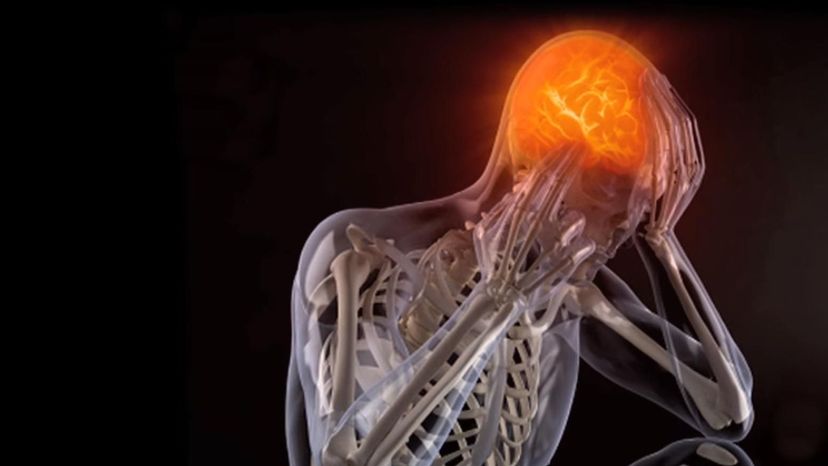
About This Quiz
Did you know that humans have about the same number of body hairs as chimpanzees? Don't rush off to find a razor. Instead, take our fascinating quiz about the wild and weird nature of the human body!We are an illuminated species -- the human body literally glows, casting of a bit of visible light in the darkness. But it's such a small amount of light that we can't detect it with our naked eyes.
The liver is one of your body's most durable organs. Not only does it help clean toxins from your body, but it can regrow itself if it is damaged.
The human brain weighs about 3 pounds, and most of that weight comes from fat. Delicious, yummy fat that zombies eat like butter.
Advertisement
Newborns don't have fully developed tear ducts, so they don't shed tears until they are 1 to 3 months old. But as any parent can tell you, that doesn't stop babies from screaming their heads off.
Each day, you need a lot of saliva to keep your mouth moist and to help you eat. Your body produces roughly 1 quart per day, but please don't start spitting in a jar to prove it.
Your wingspan is roughly the same as your height. This is yet another reason that 7-foot-tall men make such good basketball players.
Advertisement
The human brain is the centerpiece of the nervous system, but the brain itself cannot feel pain. If you get migraines, you might disagree.
If your heart stops beating, rescuers generally have about 5 minutes to revive you before brain damage sets in. However, in extremely cold conditions, body processes slow … and the brain can survive much longer without oxygen.
The equator is about 25,000 miles long, and your adult blood vessels could circle the equator about four times, meaning your circulatory system is roughly 100,000 miles in total length.
Advertisement
Stomach acid has a pH level of between 1.0 and 2.0, a fact that helps keep your gut from being invaded by foreign microbes. The acid is strong enough that, given the right conditions, it can dissolve steel. Please don't eat a fork to test this theory.
Humans naturally have a left lung that is smaller than the right. That's because you need room for your ribcage and heart.
The human brain is one of the most wrinkled and folded in the animal kingdom, and its complexity is associated with intelligence. Less intelligent animals like mice and politicians have much smoother brain matter.
Advertisement
Nerves link the nose and eyes, so when you sneeze, the tendency is to shut your eyes tight. But some weirdos are able to sneeze with their eyes wide open, freaking out innocent bystanders and small children.
On average, the human heart beats just under 5,000 times per hour, or 115,000 times per day. Unless, of course, we're talking about my cold-hearted mother-in-law. Hers doesn't beat at all.
The appendix is notorious for sudden (and life-threatening) infections. But this little organ is beneficial to the bacteria that make your digestive system work properly.
Advertisement
Your retinas see the world upside down. But in a nifty (and necessary) trick, your brain turns the image right side up so that you don't get very, very confused.
Nerve impulses are incredibly fast, helping us to react very quickly to external stimuli. These impulses travel at around 275 MPH.
It's a common misconception that new babies have totally blurry vision. The reality is that most of them can see clearly to a distance of about 1 foot.
Advertisement
Many people mistakenly believe that sweat smells terrible. But it's actually the bacteria feeding on your sweat that generates an off-putting smell.
You might feel like you have 1 million gallons of blood after that nasty paper cut spews all over the place. But the average adult is only slogging around with maybe 1.5 gallons of the vital fluid.
Humans have big brains with regard to their body size. Their big brains are why they rule the animal kingdom.
Advertisement
The ovum (egg) is the largest human body cell. Compared to many cells, the egg is huge -- it has a diameter of nearly 1 millimeter.
Most people blink approximately 17 times per minute. Unless, of course, you're a shady politician and you're lying at the podium. Then you might blink so much that people offer you eyedrops.
Women have more body fat near their body cores, but their extremities aren't as protected. Plus, when exposed to cold temperatures, the blood vessels in their hands constrict more quickly than men's.
Advertisement
Your eyes require significant lubrication. That's why your tear ducts produce about 1 teaspoon of fluid every hour.
Humans have roughly 1.5 gallons of blood. That means blood accounts for 8% of your total body weight.
The human heart is incredibly powerful … and strong. It may pump more than 3 billion times during an average human life.
Advertisement
Bone marrow is incredibly important to human life -- it produces the blood cells that keep us alive. Each second, marrow manufactures about 2 million new blood cells.
Maybe you've witnessed your grandparents rubbing their aching bodies and swearing that a storm is coming. Scientists aren't sure, but people who have inflammation or arthritis may indeed feel shifts in barometric pressure, which can indicate that a change in the weather is imminent.
Granted, no one's ever going to sit there with a microscope and count them all by hand. But scientists estimate that there are 100 million neurons in the human brain.
Advertisement